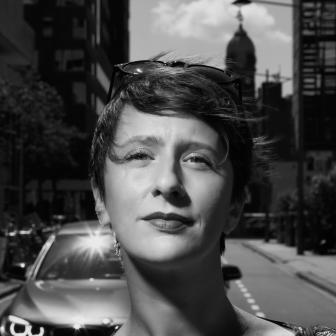Poem
Samantha Barendson
5
It took me fifteen pages to write the word Daddy.I never use that word.
Usually I say father, because I never talk to him,
I speak about him in a narrative way,
I say:
my father was Italian,
my father died in nineteen seventy-eight,
my father met my mother in Buenos Aires,
my father worked in a travel agency,
my father went to Spain with my mother,
my father had two brothers and two sisters.
I never say Daddy.
Daddy is childish,
Daddy is for when he’s there, in front of you
and you can touch him and you can tell him:
Look, Daddy, I’ve got a ten out of ten in Italian.
Daddy is to tell him: I love you Daddy,
to tell him: fuck off Daddy.
5
Pas na vijftien bladzijden kan ik het woord papa schrijven.Nooit spreek ik het uit.
Hoogstens zeg ik vader want ik richt me nooit tot hem,
ik praat over hem in mijn verhalen,
ik zeg:
mijn vader was Italiaan,
mijn vader is in achtenzeventig overleden,
mijn vader heeft mijn moeder in Buenos Aires leren kennen,
mijn vader werkte in een reisagentschap,
mijn vader is met mijn moeder in Spanje gaan wonen,
mijn vader had twee broers en twee zussen.
Ik zeg nooit papa.
Papa is kinderachtig,
papa zeg je als hij voor je staat
en je hem kunt aanraken en zeggen:
hier, kijk, papa, ik heb een tien voor Italiaans.
Papa is om te zeggen: ik hou van je papa,
om te zeggen: de pot op, papa.
5
Il a fallu quinze pages pour écrire le mot papa.Je ne dis jamais ce mot.
Au mieux je dis père car je ne m’adresse jamais à lui,
je parle de lui en narration,
je dis:
mon père était italien,
mon père est décédé en soixante-dix-huit,
mon père a rencontré ma mère à Buenos Aires,
mon père travaillait dans une agence de voyages,
mon père est parti vivre en Espagne avec ma mère,
mon père avait deux frères et deux soeurs.
Je ne dis jamais papa.
Papa c’est enfantin,
papa c’est quand il est là devant toi
et que tu peux le toucher et lui dire :
tiens, regarde, papa, j’ai eu un vingt sur vingt en italien.
Papa c’est pour lui dire : je t’aime papa,
pour lui dire : tu fais chier papa.
Poems
Poems of Samantha Barendson
Close
5
It took me fifteen pages to write the word Daddy.I never use that word.
Usually I say father, because I never talk to him,
I speak about him in a narrative way,
I say:
my father was Italian,
my father died in nineteen seventy-eight,
my father met my mother in Buenos Aires,
my father worked in a travel agency,
my father went to Spain with my mother,
my father had two brothers and two sisters.
I never say Daddy.
Daddy is childish,
Daddy is for when he’s there, in front of you
and you can touch him and you can tell him:
Look, Daddy, I’ve got a ten out of ten in Italian.
Daddy is to tell him: I love you Daddy,
to tell him: fuck off Daddy.
5
It took me fifteen pages to write the word Daddy.I never use that word.
Usually I say father, because I never talk to him,
I speak about him in a narrative way,
I say:
my father was Italian,
my father died in nineteen seventy-eight,
my father met my mother in Buenos Aires,
my father worked in a travel agency,
my father went to Spain with my mother,
my father had two brothers and two sisters.
I never say Daddy.
Daddy is childish,
Daddy is for when he’s there, in front of you
and you can touch him and you can tell him:
Look, Daddy, I’ve got a ten out of ten in Italian.
Daddy is to tell him: I love you Daddy,
to tell him: fuck off Daddy.
Sponsors

























